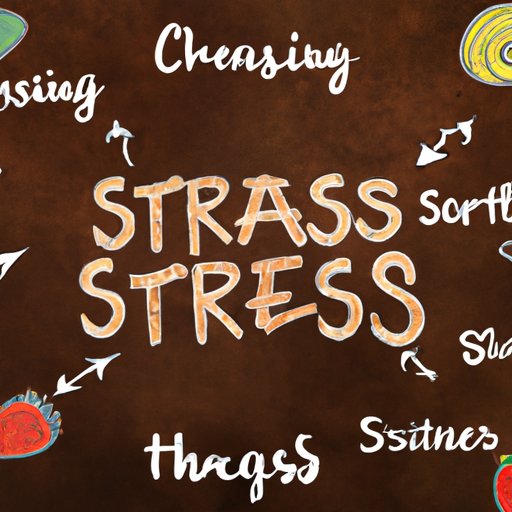
I. Introduction
Stress eating, or the habit of turning to food as a coping mechanism in times of stress, is a common phenomenon that can have negative consequences for our health and well-being. While it may provide temporary comfort, overeating or reaching for unhealthy foods can have long-term consequences for our physical and mental health. In this article, we’ll explore practical strategies for breaking the cycle of stress eating, from mindfulness techniques to healthy food choices and habit-changing strategies.
II. The Mindful Approach: How to Break the Cycle of Stress Eating
Stress and unhealthy eating habits often go hand in hand, as we may turn to food as a way to soothe or distract ourselves from stressful situations. However, this only perpetuates the cycle of stress and poor health. One alternative approach is mindfulness, or the practice of being present and aware in the moment. Practicing mindfulness during meals can help us break the automatic patterns of stress eating and make healthier choices.
Some practical tips for practicing mindfulness during meals include:
- Chewing slowly and savoring the flavors of your food
- Paying attention to the physical sensations of hunger and fullness
- Acknowledging any thoughts or emotions that come up, without judgment
In addition, there are many other strategies for coping with stress that do not involve turning to food. Taking a deep breath, going for a walk, or engaging in a relaxing hobby can all help to reduce stress levels and promote overall well-being.
III. From Comfort Food to Clean Eating: A Guide to Overcoming Stress Eating
While comfort food may be the go-to option for many of us during times of stress, these foods are often high in calories, fat, and sugar, and may only provide temporary relief from stress. In fact, research has shown that consuming a high-fat diet may actually increase feelings of stress and anxiety. Making healthier food choices can help break the cycle of stress eating and promote overall health and well-being.
Some tips for making healthier food choices during times of stress include:
- Preparing nutritious meals ahead of time to avoid reaching for unhealthy options
- Keeping healthy snacks on hand, such as fresh fruit or nuts
- Exploring healthier alternatives to common comfort foods, such as replacing mashed potatoes with mashed cauliflower or making baked sweet potato fries
IV. Breaking Bad Habits: Simple Strategies for Stopping Stress Eating
Habits play a powerful role in our eating behavior, and breaking the cycle of stress eating requires changing these habits. Keeping a food diary, for example, can help us become more aware of our eating patterns and identify areas for improvement. Practicing mindful snacking and establishing a regular eating routine can also help us develop healthier habits.
In addition, making lifestyle changes that promote overall well-being can make it easier to make healthy choices and break the cycle of stress eating. Getting enough sleep, practicing stress-reducing activities like yoga or meditation, and engaging in regular exercise can all support a healthier lifestyle.
V. The Science of Stress Eating: Understanding Your Triggers
Understanding the psychological and physiological factors that contribute to stress eating can help us identify our own personal triggers and develop coping mechanisms to interrupt the cycle. For example, certain emotions or situations may be more likely to trigger stress eating, or certain types of food may be more tempting during times of stress.
Some coping mechanisms that can help interrupt the stress eating cycle include:
- Cultivating self-compassion and self-care practices
- Engaging in distraction techniques, such as taking a walk or calling a friend
- Practicing relaxation techniques like deep breathing or progressive muscle relaxation
VI. Discovering Mindful Eating: Strategies for Eating With Intention and Awareness
Mindful eating is a powerful practice that involves being present and aware during meals. By eating with intention and awareness, we can break the cycle of automatic, mindless eating and make healthier choices that support our overall well-being. Some practical strategies for cultivating mindful eating habits include:
- Eating without distractions, such as watching TV or surfing the web
- Focusing on the present moment and paying attention to the taste, texture, and aroma of your food
- Tuning in to your body’s hunger and fullness signals, and stopping when you feel satisfied
Mindful eating has been shown to promote better digestion, improved mental well-being, and more positive relationships with food and eating.
VII. Conclusion
Stress eating can have a negative impact on our physical and mental health, but it is a cycle that can be broken. By practicing mindfulness, making healthier food choices, breaking bad habits, and finding coping mechanisms that work for us, we can develop a healthier relationship with food and stress. Remember, small changes can lead to big results over time. Try out the strategies outlined in this article and see what works best for you.





